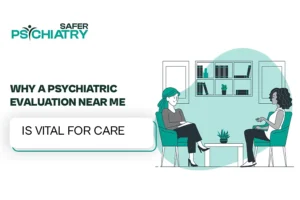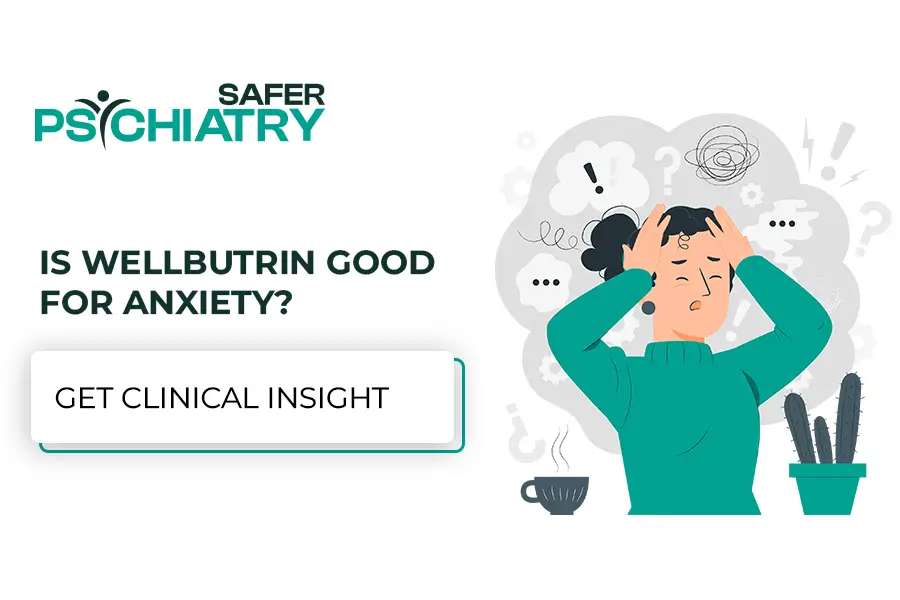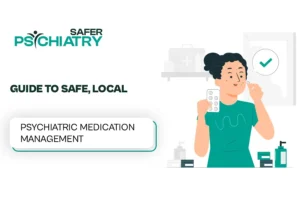
Is Wellbutrin Good for Anxiety?
Get Clinical Insight
At Safer Psychiatry, we provide compassionate, evidence – based mental health care to support your well-being now and for the future – because your journey matters, and so do you.

At Safer Psychiatry, we understand the complex relationship between anxiety and the medications prescribed to treat it. One of the most common questions we hear is:
“Is Wellbutrin good for anxiety?”
This blog post offers evidence-based insight, real-world examples, and our clinical viewpoint as a trusted mental health provider, to help you or your loved one make informed decisions about medication and care.
Understanding Wellbutrin (Bupropion) - How It Works
Wellbutrin (generic: bupropion) is an antidepressant known for increasing dopamine and norepinephrine levels in the brain. These neurotransmitters affect energy, focus, and mood making Wellbutrin especially helpful for individuals dealing with low motivation, fatigue, and depression.
But unlike many other antidepressants, Wellbutrin doesn’t affect serotonin, which is often the key chemical targeted in anxiety treatment. This is why Wellbutrin can work very well in some anxiety cases, and poorly or even worsen others.
When Is Wellbutrin Good for Anxiety?
As psychiatric providers, we’ve seen Wellbutrin work best for:
- Individuals with anxiety tied to depression
- Patients who have ADHD and anxiety
- People who feel emotionally “numb” or low energy
- Cases where patients didn’t respond well to SSRIs due to side effects
In these situations, Wellbutrin for anxiety and depression can be both stabilizing and motivating , especially when paired with therapy.
When Can Wellbutrin Worsen Anxiety?
Despite its benefits, Wellbutrin may not be ideal for everyone.
Some individuals experience:
- Increased restlessness
- Racing thoughts
- Insomnia
- Heightened irritability
These symptoms typically occur in the first few weeks, especially at higher doses or if the person is already prone to panic attacks or obsessive-compulsive thoughts.
Real experience: Many patients on forums like Reddit report that “Wellbutrin made my anxiety worse at first,” but some also say it calmed down by week 4 with support and dose adjustment.
Does Wellbutrin Help with Anxiety Symptoms Long-Term?
Yes in select cases. While Wellbutrin isn’t FDA-approved for anxiety, it often works indirectly by treating:
- Underlying depression
- Low self-worth
- Motivational paralysis
- ADHD-related overwhelm
We’ve seen success in patients with generalized anxiety who feel chronically drained or hopeless. However, it’s not typically first-line for panic disorder, OCD, or severe social anxiety conditions that respond better to SSRIs or therapy-first approaches.
What to Pair with Wellbutrin for Anxiety
In clinical care, combination treatment is common. If Wellbutrin alone doesn’t ease anxiety, we may suggest:
- Cognitive Behavioral Therapy (CBT) or trauma therapy
- Low-dose SSRI (like Lexapro) for added serotonin support
- Buspirone for milder anxiety without sedation
- Sleep hygiene plans if insomnia becomes an issue
From our provider team: “The best outcomes come from tailored care, not just medication. Pairing Wellbutrin with therapy or lifestyle adjustments makes a real difference.”
Wellbutrin Dosage for Anxiety - What’s Typical?
Starting low and increasing gradually helps reduce side effects:
Form | Starting Dose | Typical Dose |
Wellbutrin IR | 100 mg/day | 200–300 mg/day |
Wellbutrin SR | 100 mg/day | 200 mg/day |
Wellbutrin XL | 150 mg/day | 300 mg/day |
Note: Some patients are more sensitive. If you’ve ever asked, “Does Wellbutrin cause
How Long Before Wellbutrin Works for Anxiety?
Patients usually feel an effect within 2–4 weeks, with full results around 6–8 weeks. Early side effects often fade with time.
If anxiety persists after 6 weeks, we may adjust dosage or explore alternate treatments.
Is Wellbutrin Right for My Anxiety?
Here’s a quick comparison of how Wellbutrin fits for different conditions:
Condition | Is Wellbutrin Helpful? |
Generalized Anxiety Disorder (GAD) | Sometimes, if linked to fatigue |
Depression + Anxiety | Often effective |
Anxiety + ADHD | Frequently helpful |
Usually not recommended | |
OCD or Social Anxiety | May worsen symptoms |
PTSD or Trauma-Linked Anxiety | Use caution; therapy recommended |
Why Choose Safer Psychiatry for Medication Management
At Safer Psychiatry, we don’t just write prescriptions—we work with you to find the safest, most effective treatment path, tailored to your emotional, psychological, and lifestyle needs.
Whether you’re exploring Wellbutrin for anxiety, or weighing other options, we guide you through:
- Comprehensive psychiatric evaluations
- Medication management with close follow-up
- Individual and trauma-informed therapy
- Care for children, teens, and adults
You Deserve Safer Care - You Deserve Clarity
At Safer Psychiatry, we believe mental wellness starts with safe, informed choices.
If you’re wondering whether Wellbutrin is good for your anxiety, let’s explore that together.
Book free consultation today and take the next step toward mental clarity and lasting support.
FAQ
Frequently Asked Questions
Has Wellbutrin helped anyone with anxiety?
Yes, it has helped many individuals, especially those whose anxiety is tied to depression, ADHD, or low energy. At Safer Psychiatry, we’ve seen Wellbutrin work well when other medications caused emotional numbness or fatigue. Patients often tell us they feel “more awake” or “less foggy,” which can indirectly ease their anxiety. However, it’s not one-size-fits-all, and for some, it may initially cause restlessness or increased worry.
Do doctors prescribe Wellbutrin for anxiety?
Yes, but usually in specific situations. While Wellbutrin isn’t FDA-approved solely for anxiety, many mental health providers prescribe it when anxiety overlaps with depression, ADHD, or low motivation. At Safer Psychiatry, we carefully assess whether Wellbutrin is a safe and effective option based on your full mental health picture, not just symptoms on paper.
How long does it take for Wellbutrin to help anxiety?
Most people begin noticing changes within 2 to 4 weeks, with full benefits usually kicking in by 6 to 8 weeks. It’s important to give your body time to adjust. Some may feel more anxious early on, but that often fades as the medication balances out. If you’re not seeing improvement by week 6, we may fine-tune your dose or explore alternative options.
Can I take therapy and Wellbutrin at the same time?
We strongly recommend it. Medications like Wellbutrin can boost your energy and focus, while therapy helps you understand and reframe the anxiety at its roots. The combination often creates the best long-term outcomes, and we’ll support you through both.
Our Company
Copyright © 2024 Safer Psychiatric Consulting Services


